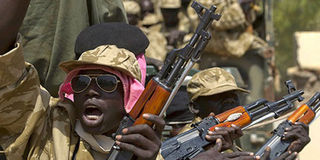UN peacekeeper killed in South Sudan ambush hours after peace deal

The attack occurred in the same contested area where 10 South Sudanese aid workers were briefly abducted by rebels in April. FILE PHOTO
What you need to know:
Tens of thousands of people have been killed and millions more uprooted or pushed to the brink of starvation in a conflict characterised by mass rape and the killing of civilians.
UNMISS, for its part, has lost 56 personnel since its deployment began in 2011.
A Bangladeshi peacekeeper in South Sudan was killed on Tuesday when an aid convoy was ambushed in the west of the country, the United Nations mission said.
"Lieutenant Commander Ashraf Siddiqui, was part of a convoy led by Nepalese peacekeepers providing protection to humanitarian workers travelling from Yei to Lasu when several shots were fired at the group by unknown gunmen," the UN Mission in South Sudan (UNMISS) said in a statement adding the peacekeeper, "was hit and died from his injuries shortly afterwards."
The UN said its peacekeepers "immediately returned fire and the assailants retreated into the forest."
"It is a tragedy that he lost his life in such an appalling act of violence while working to help those in need and to protect the lives of others," David Shearer, head of the 13,000-troop force, said.
The attack occurred in the same contested area where 10 South Sudanese aid workers were briefly abducted by rebels in April.
South Sudan has been mired in civil war since December 2013 during which aid workers and peacekeepers have frequently been targeted.
Tens of thousands of people have been killed and millions more uprooted or pushed to the brink of starvation in a conflict characterised by mass rape and the killing of civilians.
UNMISS, for its part, has lost 56 personnel since its deployment began in 2011.
READ:
Peace deal
South Sudanese President Salva Kiir and rebel leader Riek Machar have today inked an agreement to end the war.
The two met in Khartoum on Monday to continue their face-to- face talks and mute all the stumbling blocks to the peace in the young nation.
On Tuesday, the two leaders reached compromises on a number of outstanding issues.
Temporary basis
The areas agreed upon include a permanent ceasefire, cantonments for all forces and the deployment of forces by Igad and the African Union to safeguard the ceasefire.
President Kiir and Dr Machar further agreed to have three capital cities; namely Juba, Wau and Malakal on temporary basis to host the three proposed vice-presidents.
According to the signed Framework Agreement, seen by the media, the two rivals agreed to allow the Khartoum government to secure the oil fields in South Sudan in coordination with the Juba administration, and to rehabilitate the wells to restore the previous levels of production.
They also declared to work together again for the third time after their long disagreement proved difficult for peace and stability.
Sudanese President Omar Bashir on Monday promised to end the war in South Sudan and pave the way for rigorous development in the war-torn state.
His promise seems to be bearing positive results on the peace process.
Community dialogues
“I would like to assure everyone that Sudan will work hard and try all measures based on our experience during the war and peace times to ensure that this initiative is a success.
“We shall use our experience in the management of national and community dialogues to address all the issues,” President Bashir said.
Interestingly, however, the Sudanese leader is a suspect wanted by the International Criminal Court (ICC) for war crimes and crimes against humanity and genocide committed in western Darfur region.
President Museveni appealed to key political players in South Sudan is to have constructive deliberations as they negotiate for peace, unity and concretize the ground for the development of their country.
"I used to see South Sudan developing but later it went into a standstill because of disunity. Today, we have had discussions on matters of peace in South Sudan and we have a good starting point to restore political normalcy. It was a good gesture that both His Excellency Salva Kiir and Dr Riek Machar shook hands, setting into motion the fruitful meeting we had today (June 25)," said Mr Museveni before adding: "I pledge full support and solidarity to ensure that South Sudan is back on the track of economic and social development. I thank His Excellency Omar el-Bashir for his concern over the political instability in South Sudan and for calling this meeting. I also salute Dr Machar for honouring this peace-making mission for the benefit of all people in his country and His Excellency Salva Kiir for being present too."




